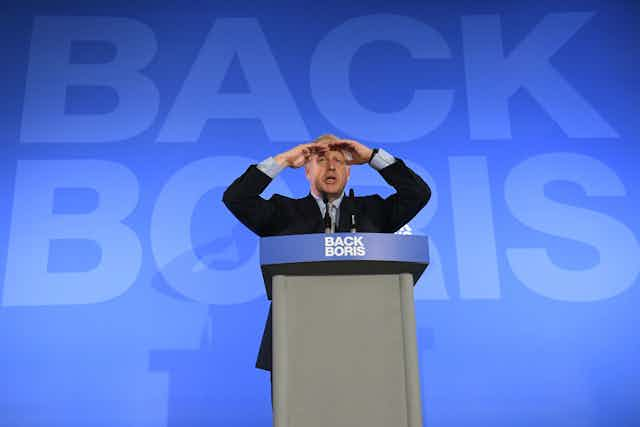The race to succeed Theresa May as Conservative leader and prime minister is in full swing. Brexit is the key issue, but the Tories’ selection rules are also a major factor shaping the contest.
Leadership candidates required eight nominations from fellow Conservative MPs to enter the contest and ten managed to pass the threshold. These ranged from Brexiteers – Boris Johnson, Dominic Raab, Andrea Leadsom and Esther McVey -– through to erstwhile Remainers – Jeremy Hunt, Sajid Javid, Matt Hancock, Rory Stewart and Mark Harper. Michael Gove now occupies an in-between position.
A two-stage system is used to choose the leader. First, MPs whittle the number of candidates down to two in a series of secret ballots. In the first ballot, candidates failing to secure the support of at least 5% of the party’s 313 MPs were eliminated, with the rest proceeding to the second round.
This process knocked out Harper, Leadsom and McVey, leaving seven candidates in the running.
Johnson came out way ahead of the field with 114 votes. Hunt took 43, Gove 37, Raab 27 and Javid 23. Hancock also made it through with 20 votes and Stewart makes up the seven with 19 votes.
In the second round on June 18, candidates must win at least 10% to proceed. Further ballots can be held on June 19 and 20 and one candidate will be eliminated each time until two remain.
Taking it to the party
In the second stage, the final two candidates seek the votes of about 150,000 grassroots party members in a postal ballot. They will engage in a series of hustings and the winner will be announced in late July.

Crucially, the distribution of opinion among MPs and the membership on Brexit differs. Party members are strongly pro-Brexit – a poll last month found that 66% favour a no-deal Brexit. Conservative MPs are more divided, with half supporting no deal in parliament’s indicative votes in March, but others – including some leadership candidates – strongly opposed. The fact that the members have the final say is expected to help any Brexiteer who reaches the all-member ballot.
Who is the favourite to win?
The favourite for the contest is Johnson, the former foreign secretary and London mayor, who resigned from the cabinet over May’s Chequers plan in 2018. He was backed by more than one-third of Tory MPs in the first ballot, far ahead of his rivals. A majority of these backers are Leavers but he has also been supported by many Remainers who believe only a Brexiteer will be acceptable to the wider party.
Johnson’s main rival among Leavers is Raab, who also resigned from the cabinet over Brexit. But Raab finished a long way behind in the first ballot and lost out on the backing of the European Research Group (ERG) of eurosceptic Tory MPs, which includes Jacob Rees-Mogg. Most leading ERG figures are supporting Johnson after he promised he would take Britain out of the EU in October, with or without a deal. Johnson would expect to attract supporters from the other Brexiteer candidates, Leadsom and McVey, who have now been eliminated, as well as Raab’s supporters if he fails to progress in the next ballot.
Johnson has many detractors among Conservative MPs, some of whom see him as untrustworthy and unreliable. But their dilemma is that they currently lack a candidate who could defeat him among the membership, given that he now looks assured of finishing the parliamentary ballots in the top two. A YouGov poll last month of Tory grassroots members found that Johnson led all of the Remainers. In head-to-heads, he would beat Javid 66% to 34%, Hunt 67% to 33%, Hancock 74% to 26% and Stewart 75% to 25%.
Some Remainers rallied behind Gove, a leading figure in the campaign to Leave the EU, but reinvented as a staunch defender of May’s Brexit deal. However, Johnson led Gove 66% to 34% and the environment secretary has since been rocked by revelations about his past use of cocaine. Since then, some Remainer MPs appear to have shifted towards Hunt.
Yet it is difficult to see what Hunt’s appeal to the grassroots would be. He is a competent performer at the top of government, but does not currently possess any obvious electoral appeal. Despite saying that he would be prepared to leave the EU without a deal, his focus is on renegotiating the current deal – which might not be possible given the EU’s resistance. He would be painted by Brexiteers as continuity May. Despite finishing second in the first parliamentary ballot, Hunt’s tally of 43 votes was probably below expectations.
Javid is lagging behind Hunt in the race, but he might be better placed to give Johnson a run for his money. Javid has an attractive back story, as the high-achieving son of an immigrant bus driver. He has taken a tougher line on Brexit than other Remainers, indicating he does not want another extension to Article 50. He would start as the underdog against Johnson but hope to overhaul him in the campaign for members’ votes, perhaps aided by some slip-ups by the frontrunner.
But to get there, he will have to come through the middle in the later parliamentary ballots to overtake Hunt to finish in the top two. The contest looks like Johnson’s to lose.

